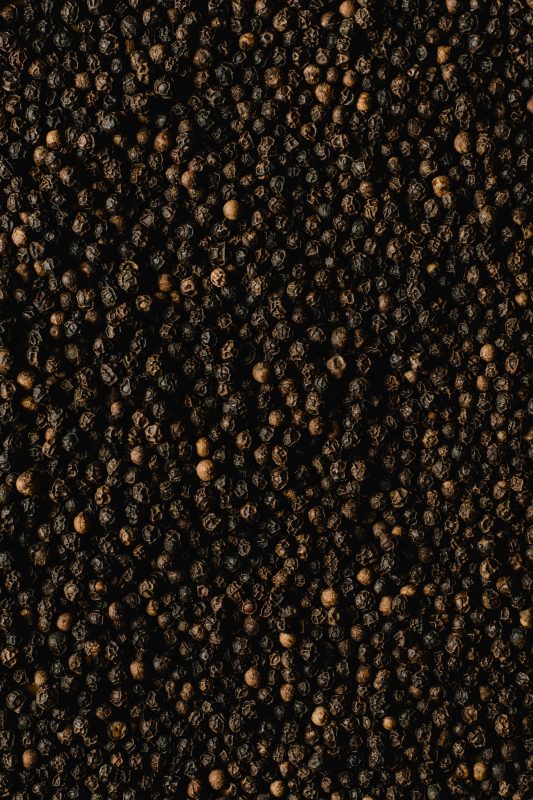Black pepper, having the scientific name Piper nigrum, is a plant of the Piperaceae family. This perennial flowering vine gets cultivated for its fruit which is called peppercorn. It is dried and cooked while unripe for its preparation as a seasoning, condiment, and spice.

Applications of Black Pepper as a Spice
Black pepper is one of the most used and traded spices worldwide that finds application in numerous dishes. It proffers a distinct spicy and hot flavor and irrefutable earthiness to the food that tastes piney, sharp, and woody simultaneously.
Black pepper gets used in any cuisine that requires a touch of spiciness. These can range from gastronomy originating from India, China, and Pakistan to Europe, the United States of America, and Africa. They enhance the natural flavor and aroma of the foodstuffs that they get added to and create a rich taste.
The spice also gets placed on tabletops of houses and restaurants, along with salt and vinegar. Some people use this black pepper over the served food. In such cases, it boosts the flavor and makes the dish spicy. It gets used in the marination of meat and fish products and also in their cooking process. It can work as a flavor enhancer when sprinkled over vegetables, toast, pasta, scrambled eggs, and many other foods. Additionally, it acts as a salad dressing. It goes exceedingly well in almost all dishes, especially the ones made of potatoes.
Most, if not all, Indian cuisines use black pepper as an ingredient in their recipes. It is also a crucial component of the country’s all-around spice blend, garam masala. It can also find application in various teas such as milk tea, black tea, etc.
Benefits of Black Pepper
Black pepper comes with multiple pros other than its role as a flavor, aroma, and taste enhancer. It can primarily get owed to its piperine component. The benefits include the following:
- Antioxidant properties: Black pepper is a valuable source of antioxidants that prevent or slow down cellular damage resulting from unstable free radicals. It also protects the body from most diseases and inflammations and the various effects and symptoms of aging.
- Nutrient Absorption: The spice enhances the uptake of particular essential nutrients and other necessary and advantageous compounds and boosts their function. It may increase the absorption of the precursor of Vitamin A, beta-carotene, and the active ingredient of turmeric, curcumin. Thus, it prevents the ailments arising from nutrient deficiency and other related causes.
- Digestion: The consumption of black pepper aids in the release of specific enzymes in the intestines and the pancreas. These help in the digestion and assimilation of carbohydrates and fats. Overall, the spice helps in clearing out the stomach and promotes proper and adequate defaecation. It also prevents the gas formation and bloating.
- Diarrhea: Black pepper inhibits the muscle spasms that occur in the digestive tract. It eliminates the factors that slow down the digestion process. The combined effect of these two prevents diarrhea and associated issues.
- Cold and Cough: The spice has antibacterial properties that help cure coughs and colds. It alleviates and relieves chest congestion resulting from flu or viral infection or pollution. Since it is rich in Vitamin C, it works as an effective antibiotic.
- Cancer: Research has discovered and stated that black pepper help in preventing the development of cancer. Its potency gets increased when paired with turmeric.
- Skin: Black pepper has significant effects on the skin as it is one of the best natural exfoliators. It also improves blood circulation, allowing the skin to receive more oxygen and eliminate the non-desirable skin wrinkles. It can also cure vitiligo. The disease causes loss of pigmentation, resulting in melanin patches over the body.
- Weight Loss: Black pepper serves as an effective way of reducing weight because it aids in increasing the body’s metabolic activities and breaking down the fat tissues and cells. The sweating generated due to its spiciness helps get rid of toxic wastes and excess water.
- Depression: The spice can stimulate the functioning of the brain and enhance it. It allows for active cognitive abilities, thinking, concentration, and overall body performance. It helps in preventing and curing depression, anxiety, and tension to a particular extent.
Black Pepper Harvest Area and Season
Black pepper thrives well in hot and humid regions, having an ideal growth temperature of around 23-32 degrees Celsius. The optimum soil temperature for its root growth lies at 26-28 degrees Celsius. The plant prefers an even distribution of 125-200cm of rainfall. It can grow well in red loam, sandy loam, clay, and red laterite soils.
The harvest period starts 7-8 months after the flowering period. It means that harvesting starts during December-January in the plains and January-April in the hilly regions. The yellowing of the berries of the plant indicates the start of this period.
